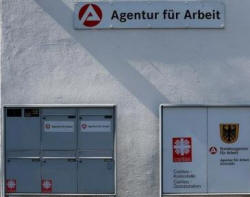|
 German
labor market resilient despite unemployment uptick German
labor market resilient despite unemployment uptick
 Send a link to a friend
Send a link to a friend
[September 30, 2015]
By Michael Nienaber
BERLIN (Reuters) - German unemployment
inched up in September due partly to late school holidays in some
states, but the jobless rate held at a post-reunification low in a
further sign that consumer spending could propel growth in Europe's
largest economy this year.
|
|
 The Federal Labor Office reported on Wednesday that the
seasonally-adjusted unemployment total rose by 2,000 to 2.795
million. That compared with the Reuters consensus forecast for a
drop of 5,000. The Federal Labor Office reported on Wednesday that the
seasonally-adjusted unemployment total rose by 2,000 to 2.795
million. That compared with the Reuters consensus forecast for a
drop of 5,000.
The unadjusted jobless total fell, however, by around 88,000 to
2.708 million, the lowest level since 1991, the Office said. The
jobless rate held steady at 6.4 percent.
"Although there was an uptick on a seasonally-adjusted basis, the
overall positive trend on the labor market continues," Federal Labor
Office chief Frank-Juergen Weise said.
ING chief economist Carsten Brzeski said the slight increase in the
seasonally adjusted total was probably the effect of summer holidays
ending in September in more regional states than usual.
Overall, the labor market looked strong and its prospects remained
bright, he said.

"The German labor market will remain an important growth driver this
year and beyond," he said.
In another good sign for private consumption, German retail sales
jumped by 2.8 percent in real terms from January to August compared
with the same period in 2014.
The statistics office said that was the strongest increase it had
recorded for that period since it began collecting the data in 1994.
Germany's HDE retail association has said it sees a record year
ahead thanks to rising wages and low inflation.
The Munich-based Ifo think-tank said last week the current influx of
refugees, expected to hit a record 800,000 this year, is boosting
the retail sector, in particular sales of groceries.
[to top of second column] |

BayernLB economist Stefan Kipar said the retail sector would benefit
from the influx of migrants.
"Every refugee who spends helps the retail sector,” he said.
However, the arrival of large numbers of refugees is expected push
up unemployment in Germany next year by 70,000, the labor office
research institute IAB has said.
Senior conservatives are therefore urging a flexible application of
the new minimum wage in relation to refugees, arguing that those
with minimal qualifications could struggle to find jobs at the 8.50
euro ($9.60) hourly rate.
(Additional reporting by Tina Bellon; Writing by Michael Nienaber;
Editing by Noah Barkin and Madeline Chambers)
[© 2015 Thomson Reuters. All rights
reserved.] Copyright 2015 Reuters. All rights reserved. This material may not be published,
broadcast, rewritten or redistributed.
 |